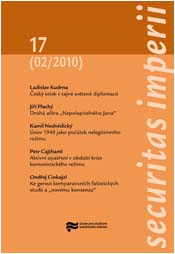Český otisk v tajné světové diplomacii
Czech involment in secret international diplomacy
Did Czech communists and U.S. diplomats know about Soviet intentions in the winter of 1939?
Author(s): Ladislav KudrnaSubject(s): International relations/trade, Security and defense, Interwar Period (1920 - 1939), WW II and following years (1940 - 1949), History of Communism
Published by: Ústav pro studium totalitních režimů
Keywords: USSR;USA;Czechoslovakia;broadcasting;diplomacy
Summary/Abstract: In 1939, five Czech communists travelled from Prague to Moscow. The reason for their journey was the fact that Moscow had ceased criticizing the actions of Nazi Germany in its radio broadcasts. In October of the same year, they finally managed to get an audience with Alexander Mihailovich Alexandrov, who was then chief of the Central European Division of the Commissariat for Foreign Affairs. These Czech “rebels” were unpleasantly surprised to learn of a non-aggression pact. Alexandrov gave them a comprehensive explanation of Stalin’s policy. It was important that the conclusion of the pact had caused the War. An encircled Germany would never have gone to war. Moscow’s objective was for the confl ict to last as long as possible and for it to be restricted to three combatants – Great Britain, France and Germany. After the collapse of the Third Reich, the Red Army would march into Europe, whose inhabitants would accept any regime that followed the end of hostilities. Whereas Lenin had succeeded in creating communism, Stalin would lead Europe into a global revolution. Besides this, the pact enabled the Soviet Union to gain Poland’s extensive eastern territories with minimal effort. Moreover, nothing could now prevent it from implementing the planned Bolshevization of the Baltic States. At the same time, in obtaining a base by the Baltic Sea, it succeeded in gaining economic and military control of that region. Hitler had put himself at the mercy of the Soviet Union. He was completely dependent economically on Moscow. Czech communists should remain calm, because the situation had never been as favourable to Soviet interests. As regards comrades who had been arrested in the Protectorate, Alexandrov told them that there would be no revolution without sacrifices. Upon returning to the occupied Czech lands, the five Czech communists made a report of their stay in Moscow. On 17 November 1989, this fell into the hands of the American Consul General in Prague, Irving Nelson Linnel, who subsequently sent it to his head office in Washington. This was where it was found after 40 years in the National Archives and Records Administration by Professor Kalvoda and Professor Lukeš, who discovered the document independently of each other. Thanks to the Israeli researcher Shaulim, a copy also eventually found its way to me. While Professor Lukeš does not doubt the authenticity of the document, some Czech historians view it with scepticism. At the beginning of the 1990s, Professor Valenta told Professor Lukeš the names of all fi ve communist “rebels”. Unfortunately, he made no record of these names, because it did not strike him as important at the time. After an intensive study of archive materials, I managed to discover a record written in Russian in the National Archives in Prague with the names of five Czech communists who attended an unspecified congress in Moscow in 1939. But are these the same five Czech communists referred to above? It is evident that until the names of these delegates are discovered and confirmed, the report will continue to be the subject of speculation. Unfortunately, without access to the archives of the Russian Foreign Ministry, there is effectively no chance of any progress on this issue.
Journal: Securitas imperii
- Issue Year: 2010
- Issue No: 17
- Page Range: 10-44
- Page Count: 35
- Language: Czech

